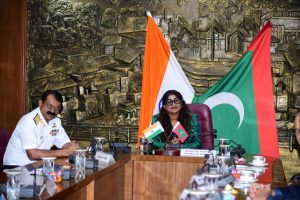Rajeswari Pillai Rajagopalan

In the continuing struggle between India and China for the support of the region’s smaller countries, India appears to have had some successes. Two of India’s smaller neighbors, the Maldives and Sri Lanka, have both demonstrated separately their need for Indian friendship and assistance. While this is not likely to be the last word by any stretch of the imagination, it does indicate that in both countries the shadow struggle will continue and that India’s diplomatic game is improving, probably as a consequence of the competition itself.
In the Maldives, an effort to generate popular opposition against India appears to have suffered a setback. The so-called “Out India” campaign was strongly rebutted by senior government officials, who emphasized that India is the country’s “closest ally and trusted neighbor” and that the social media campaign did not reflect the views of the majority of Maldivians.
The Out India campaign itself is curious because it has not been supported by any public figures and appears entirely confined to social media. Nevertheless, the Out India campaign follows an earlier effort, one supported by public figures, that sought to curtail Indo-Maldivian relations by accusing the Maldivian government of agreeing to allow the stationing of Indian military personnel in the Maldives. This followed the publication of a leaked document allegedly from the Maldivian Ministry of Defense, though the Maldives National Defense Force (MNDF), Ministry of Foreign Affairs and other government officials dismissed the document as forgery. Whatever the source of these efforts to undermine Indo-Maldivian ties, it appears to have done the opposite. Senior Maldivian government officials, including the president, reiterated their desire for close relations with India.
Indeed, Maldivian Defense Minister Mariya Ahmed Didi was on a six-day official visit to India last week. She was the chief guest at the passing-out parade of officer cadets at the Indian Naval Academy in Kannur in southern India. With this, she becomes the only foreign defense minister to witness a passing-out parade at an Indian naval institution. This is a clear reflection of the effort India is making to generate growing trust between the two countries.
A few days earlier, Didi was speaking at a defense gathering organized by the Constitution Club of India where she highlighted the close partnership between New Delhi and Male and characterized it as “stronger than ever.” She went on to add, “It’s not anchored by our shared values, history and perspectives alone, India is and has been our first and best responder in all times of need.” Further, she thanked India for the “single-largest financial assistance from a donor during this pandemic.”
The Maldives is perhaps more of an exception, having a remarkably strong relationship with India at this point. Efforts to undermine relations may have actually strengthened them Indian diplomacy has also been quite subtle in allowing Maldivian officials to take the lead rather than jump in and spoil the situation by being too brash.
Another neighbor where India’s prospects may be improving is Sri Lanka. Although India’s relations with Sri Lanka have been far more troubled than with the Maldives, thing may be beginning to look up. India may have been miffed about Sri Lanka’s decision to cancel the Indo-Japanese joint project to develop the East Container Terminal in Colombo, and Colombo subsequently giving that project to China, but New Delhi may have another chance to gain Sri Lankan good will. Colombo has found itself in facing increasing difficulties with China and appears now to be looking toward New Delhi.
One source of difficulty is the contaminated fertilizer issue. Sri Lankan health inspectors claimed to have found some fertilizer supplied by China to be contaminated. The controversy dragged in the Sri Lankan courts, which forced the cancellation of payments for the fertilizer. This in turn triggered an angry response from China, which included blacklisting of the state-owned People’s Bank, which has not gone down well with Sri Lanka. By contrast, India airlifted 100 tonnes of nano fertilizer to Sri Lanka, responding to a call from the government of Sri Lanka, to make up for a fertilizer shortage that Sri Lanka was facing. India’s positive response and quick action and the contrast with China’s behavior is unlikely to go unnoticed.
India is also likely to look favorably on any Sri Lankan request for help in overcoming its current financial and economic crisis. Colombo certainly hopes that India will be able to help. Sri Lankan Finance Minister Basil Rajapaksa reached New Delhi on November 30, where he was expected to meet senior Indian officials, including Prime Minister Narendra Modi. This gives India another opportunity to solidify its credentials as a good neighbor and make some gains over China in the region.
Of course, this is by no means the final round in the Sino-Indian competition for the affection of the region, but both India’s improved diplomatic skill in handling its neighbors as well as the peculiar ineptness that China’s diplomacy has been demonstrating has made the competition a lot more even. Indeed, it may have given India even an advantage, but how big an advantage remains to be seen.
No comments:
Post a Comment